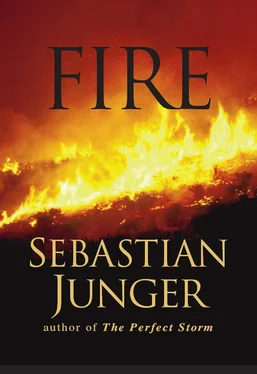It had begun. Explosions flashed continually against the Taliban positions on the ridge, and rockets started streaking back and forth across the dark valley. We could see the lights from three Taliban tanks that were making their way along the ridgeline to reinforce positions that were getting overrun. A local cameraman named Yusuf had shown me footage of seasoned mujahidin attacking a hill, and I was surprised by how calm and purposeful the process was. In his video the men moved forward at a crouch, stopping to shoot from time to time and then moving forward again until they had reached the top of the hill. They never stopped advancing, and they never went faster than a walk.
Unfortunately, I doubted that the battle I was watching was being conducted with such grace. They were just kids up there, mostly, on the hill in the dark with the land mines and the machine-gun fire and the Taliban tanks. Massoud was yelling on the radio a lot, long bursts of Dari and then short silences while whoever he was talking to tried to explain himself. Things were not going well, it seemed. Some of the commanders weren’t on the front line, where they belonged, and their men had gone straight up the hill instead of circling. As a result, they had attacked through a minefield. Massoud was in a cold fury.
“I never told you to attack from below. I knew it would be mined,” he told one commander in the bunker. The man’s head tipped backward with the force of Massoud’s words. “The plan was not to attack directly. That’s why you hit the mines. You made the same mistake last time.”
The commander suggested that the mistake might have been made by the fighters on the ground.
“I don’t care. These are my children, your children,” Massoud shot back. “When I look at these fighters, they are like lions. The real problem is the commanders. You attacked from below and lost men to land mines. For me, even if you took the position, you lost the war.”
The offensive was supposed to continue all night. Reza and I ate dinner with Massoud, then packed up our truck and set out on the long drive back to Khvajeh Baha od Din. We were leaving the front for good, and on the way out of town we decided to check in at the field hospital. It was just a big canvas tent set up in a mud-walled courtyard, lit inside by kerosene lanterns that glowed softly through the fabric. We stopped the truck and walked inside, and we were just wrapping up our conversation with the doctor when an old Soviet flatbed pulled up.
It was the first truckload of wounded, the guys who had stepped on mines. They were stunned and quiet, each face blackened by the force of a land mine blast, and their eyes cast around in confusion at the sudden activity surrounding them. The medics lifted the men off the back of the truck, carried them inside, and laid them on metal cots. A soldier standing next to me clucked his disapproval when he saw the wounds. The effect of a land mine on a person is so devastating that it is almost disorienting. It takes several minutes to understand that the sack of bones and blood and shredded cloth that you’re looking at used to be a man’s leg. One man lost a leg at the ankle; another man lost a leg at the shin; a third lost an entire leg to the waist. This man didn’t seem to be in pain, and he didn’t seem to have any understanding of what had happened to him. Both would come later. “My back hurts,” he kept saying. “There’s something wrong with my back.”
The medics worked quickly and wordlessly in the lamplight, wrapping the stumps of the legs with gauze. The wounded men would be flown out by helicopter the next day and would eventually wind up in a hospital in Tajikistan. “ This is the war,” Reza hissed over and over again as he shot photos. “ This is what war means.”
Reza had covered a lot of wars and seen plenty of this in his life, but I hadn’t. I ducked out of the tent and stood in the cold darkness, leaning against a wall. Dogs were barking in the distance, and a soldier shouted into his radio that the wounded were coming in and they needed more medicine, now. I thought about what Reza had said, and after a while I went back inside. This is the war too, and you have to look straight at it, I told myself. You have to look straight at all of it or you have no business being here at all.
My research into wildfire began when Frank Carroll—then with the Boise National Forest—ignored the fact that I had no press credentials whatsoever, and wrote me a journalist pass that allowed me access to the Flicker Creek fire. My first thanks must go to him. I then embarked on a career of foreign reporting that started with a completely ill-prepared trip to Sarajevo in 1993. I am deeply indebted to Harald Doornbos—a first-rate reporter and now a good friend—who gave me a place to stay, showed me the ropes, and generally kept me out of trouble while I was there. After that I had the luxury of going to foreign countries on assignment for magazines. I would like to thank John Atwood and John Rasmus, formerly at Men’s Journal; Hampton Sides at Outside; Ned Zeman, Doug Stumpf, and Graydon Carter at Vanity Fair; and Steve Byers at Adventure. I am particularly indebted to Steve Byers, who—while at Men’s Journal —bought my first national magazine piece, and years later sent me to Afghanistan to profile Ahmed Shah Massoud. I would also like to single out Graydon Carter, the editor in chief at Vanity Fair, for publishing what—to many of his readers—were extremely upsetting articles about war. I’m sure it was not an easy thing for an editor to do, and I deeply appreciate his confidence in my work. I would also like to thank Starling Lawrence and Drake Bennett at W. W. Norton, as well as the many people there and at HarperCollins, for their great work and longstanding support. Photographer Teun Voeten accompanied me on many of my magazine assignments, and I would like to thank him for his companionship and his great work. And the book wouldn’t exist at all without the great advice and friendship of my agent, Stuart Krichevsky, as well as Paula Balzer and Shana Cohen at his office.
Then there are my family and friends, without whom I would not be the person I am, and therefore not the journalist either. That said, I would like to thank Janine DiGiovanni, Scott Anderson, John Falk, Rob Leaver, Don Beal, Khristine Hopkins, John Vaillant, Emery Vaillant, John Evans, Victoria Bruce, Shane Dubow, Amy Kimball, Jackie Ginley, and Stephen Zanichkowsky for their interest and involvement in my work. My mother and father, Ellen and Miguel Junger, and my sister, Carlotta, have also been tremendously supportive. I am sorry for the times that I have worried them while I was on assignment. I have dedicated this book to Ellis Settle, the uncle of my oldest friend, a man of incredible wisdom whose unshakable respect for the working men and women of this world I have tried to emulate my entire life. Without the great privilege of knowing him and his wife, Joanna, I would very possibly not be a journalist at all.
Finally, I would like to point out that the profession of foreign reporting wouldn’t even exist without the help of local people whose names never appear in articles, whose faces never appear on television screens. I would like to reserve my final thanks and admiration for the translators, fixers, drivers, guides, and sources who have helped me in the various countries I have worked. As locals, they take risks that no one with a foreign passport even has to contemplate. These people are too many to designate by name, but the crucial role they play in journalism should always be remembered.
The Perfect Storm
Читать дальше












